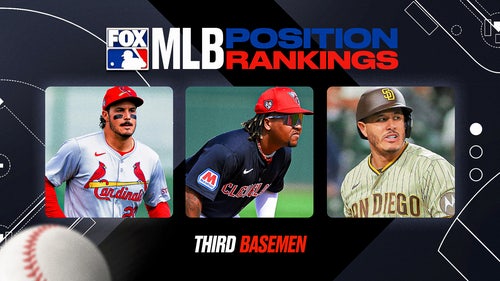
Hall of Fame 2018: Here's Who Will Get In
Congrats to Tim Raines, Jeff Bagwell and Pudge Rodriguez on their election to baseball’s Hall of Fame. With their elections fresh in our minds, let’s analyze the candidates for the Hall of Fame class of 2018.
Missing being inducted to baseball’s Hall of Fame by five votes, Trevor Hoffman will feel it today but he should be a lock for 2018, unless the sabermetric community comes up with an advanced statistic to keep closers out of the Hall. Missing by 15 votes, Vladimir Guerrero should also be a lock for 2018 as voters will hopefully reward him for being one of the most dangerous hitters of all-time (as in no strike zone was big enough to contain his swing). It is a shame Guerrero cannot enter the same class as another former Expos outfielder (Tim Raines) but Vlad should not have as long a wait as Raines had.
Given the percentages from the Hall’s 2017 vote (and not to mention pretty convincing cases on the field), Hoffman and Guerrero should be written in in Sharpie as part of 2018’s class. The class could be shaping up to be more competitive than ever to get in, as there are a number of exceptional cases who will be up for evaluation. Given Ivan Rodriguez’s inclusion into the Hall on his first attempt, it seems that voters value fielding and defense (as well as hitting milestones), which should bode well for a few of the candidates under consideration for 2018.
No Doubters: Trevor Hoffman, Vlad Guerrero, Chipper Jones
Chipper Jones: A franchise icon, it isn’t a question of if he’ll get in but how high a percentage he will receive. Chipper is the only switch-hitter with an average over .300 (.303), OBP over (.400) and over 400 home runs. When you think of third basemen of the era, the first name most think of is Chipper’s.
Warning Track: (in order of expected percentage of the 2018 vote)
In 2017, five players reached over 70 percent and nine players reached over 50 percent. The vote in 2018 could see double-digit candidates with over 50 percent of the vote. Here’s where it gets interesting.
Jim Thome: How do you feel about the DH? Thome was a DH in 33.8 percent of games he played in his career and due to the DH extending his career, he was able to accumulate some of the best power numbers of all-time, finishing seventh in HR (612) and 26th in RBI (1,699). He also had a .402 OBP (seventh all-time in walks). Hall of Fame numbers for sure, but will he make it on his first attempt? His time at DH and the lack of personal silverware (his highest placing for MVP was fourth) might mean he waits until his second or third attempt.
Edgar Martinez: Now, tell me how you really feel about the DH? Following his 18-year career all with one club, Seattle Mariners long-time DH Edgar Martinez did not reach any mythical milestones like 500 HR or 3,000 hits but he did have an OBP of .418. If status as a DH is held against Thome, then it will really be held against Martinez who played 70.3 percent of his appearances as a DH. While Thome has 10 more chances in front of BBWAA voters, Martinez is down to his final two.
Scott Rolen: Similarly to the case of Tim Raines, who might have been elected to the Hall of Fame earlier if he was a leadoff hitter in any other era than the one shared with Rickey Henderson, Scott Rolen playing as a third baseman at the same time as Chipper Jones might harm his chances of being voted in to the Hall. With eight Gold Gloves and a Rookie of the Year (1997) to his name, Rolen had a solid, consistent career. Averaging fewer than 120 games per season, injuries kept him from building up the required milestone stats the Hall of Fame typically rewards. If it was the Hall of Very Good, he would get in, but he is a candidate that will have a challenge crossing the 75 percent threshold.
Omar Vizquel: Eleven Gold Gloves and a reputation for the best fielding shortstop in baseball, Omar Vizquel posts slightly better numbers than Hall of Famer Ozzie Smith in every category but steals and Gold Gloves (the Wizard of Oz had 13). His 2,877 hits fall just shy of the 3,000 hit milestone although they are the most for any Venezuelan-born player. He will not make it in 2018 but his case could build over time, especially as his closest comparison (Smith) is already in the Hall.
Mike Mussina: Mussina’s candidacy progressed at the 2017 vote as he crossed the 50 percent threshold for the first time. His career was remarkably consistently good with 270 wins (exactly 15 wins per season), a 3.6 K-to-walk ratio and seven Gold Gloves. He even won 20 games in his final season. There are six more opportunities for Mussina to increase his percentage to get into the Hall.
The Hall’s Morality Clause: Barry Bonds, Roger Clemens, Curt Schilling
Bonds and Clemens made jumps with this most recent vote and now the question to ask is “Will there always be at least 25.1 percent hard-line voters against players suspected of using PEDs?” If Tom Verducci and others stay strong in their voting preferences, the incremental increases Bonds and Clemens make might come to a screeching halt.
Trending in the wrong direction, Curt Schilling’s percentage decreased below the 50 percent threshold as controversial comments seemed to turn off voters as he dipped to 45 percent from 52.3 percent. His career stats of 216-146 with a 3.46 ERA are not good enough for the Hall on their own and his comments continue to overshadow the one stat that is worthy of Hall consideration (one bloody sock) so expect his percentages to continue to decrease.
More from Call to the Pen
Best of the Rest:
Larry Walker: Darling candidate of the advanced metric crowd did not get the required bump in 2017. Perhaps Jonah Keri can work his magic for another former Expos outfielder now that his work for Raines is done.
Andruw Jones: Spectacular defensive player and memorable during all those playoff appearances in Atlanta, he had nine of his 10 Gold Gloves and 300 home runs before he turned 30. His 30s weren’t so kind, however.
Jeff Kent: Perhaps he should be included in the morality clause group as voters don’t seem to like him. 16.7 percent is steady (in 2016 he was 16.6 percent) but nowhere near 75 percent for the rare second baseman / clean-up hitter with good power numbers.
Fred McGriff: The reason why anti-steroid voters continue to rage. A very good career was overshadowed by the stats put up by PED users.
Hideki Matsui: Will voters consider his statistics from Japan?
Jamie Moyer: Longevity is the reason for 269 wins. A strong total but not enough.
Johnny Damon: A very good leadoff hitter on a couple of championship teams, he will get some votes from those who lean toward a big Hall but will likely never cross 50 percent.
Johan Santana: At his peak, Santana was Hall of Fame-worthy with two Cy Youngs and three top 5 finishes in five years. His peak was too short as the statistics compiled over his career were not enough.
Billy Wagner: Closer with electric fastball but if Hoffman struggles because he is a closer, Wagner’s career numbers will have a challenge as well.




